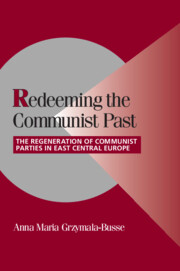Book contents
- Frontmatter
- Contents
- List of Tables
- List of Acronyms
- Acknowledgments
- INTRODUCTION: SURVIVING DEMOCRACY
- 1 THE ROOTS OF REGENERATION: COMMUNIST PRACTICES AND ELITE RESOURCES
- 2 BREAKING WITH THE PAST, REORGANIZING FOR THE FUTURE
- 3 DEVELOPING PROGRAMMATIC RESPONSIVENESS
- 4 CONVINCING THE VOTERS: CAMPAIGNS AND ELECTIONS
- 5 PARLIAMENTARY EFFECTIVENESS AND COALITIONS
- CONCLUSION: SUCCEEDING IN DEMOCRACY
- APPENDIX A THE CONTENT ANALYSIS OF PROGRAMS
- APPENDIX B THE QUANTITATIVE ANALYSIS OF ELECTORATES
- APPENDIX C THE STRUCTURES OF COMPETITION
- Bibliography
- Index
- Titles in the series
2 - BREAKING WITH THE PAST, REORGANIZING FOR THE FUTURE
Published online by Cambridge University Press: 04 December 2009
- Frontmatter
- Contents
- List of Tables
- List of Acronyms
- Acknowledgments
- INTRODUCTION: SURVIVING DEMOCRACY
- 1 THE ROOTS OF REGENERATION: COMMUNIST PRACTICES AND ELITE RESOURCES
- 2 BREAKING WITH THE PAST, REORGANIZING FOR THE FUTURE
- 3 DEVELOPING PROGRAMMATIC RESPONSIVENESS
- 4 CONVINCING THE VOTERS: CAMPAIGNS AND ELECTIONS
- 5 PARLIAMENTARY EFFECTIVENESS AND COALITIONS
- CONCLUSION: SUCCEEDING IN DEMOCRACY
- APPENDIX A THE CONTENT ANALYSIS OF PROGRAMS
- APPENDIX B THE QUANTITATIVE ANALYSIS OF ELECTORATES
- APPENDIX C THE STRUCTURES OF COMPETITION
- Bibliography
- Index
- Titles in the series
Summary
Even with the advantages of elite political resources, party regeneration was far from inevitable. It required an enormous transformation of the communist parties' organizations from tools of authoritarian rule to instruments of democratic competition. Once they were forced out of power, these parties now had to signal their new intentions, obtain strategic flexibility, and steel themselves for further programmatic, electoral, and parliamentary transformation. To that end, early and rapid centralization of the organization and a symbolic break with the past were crucial. One resulting irony was that success in democracy often involved profoundly undemocratic organizational means: weakening or eliminating party membership, abolishing internal debates, and reducing local autonomy.
Organizational transformation was a response to the parties' radically changed circumstances. The more the parties were discredited, and the greater the opposition they faced, the bigger the change required, both to function in a democracy and to convince the public of the parties' new intentions. The regime collapse and the parties' chaotic exit from power led to both administrative turnover and a clear signal of a dramatic change in the status quo, allowing change in policy and within organizations (Kingdon 1984). However, the communist parties first had to extricate themselves from tangled webs of organizational structures, which were as unwieldy as they were vast (see Table 2.1).
There were three main reasons for this organizational sprawl throughout the communist era. First, the parties held a monopoly on legislative, executive, and judicial decisions and administration.
- Type
- Chapter
- Information
- Redeeming the Communist PastThe Regeneration of Communist Parties in East Central Europe, pp. 69 - 122Publisher: Cambridge University PressPrint publication year: 2002



